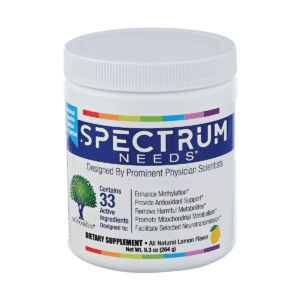$84
MOLYBDENUM
Molybdenum is a mineral that must be obtained in the diet and is required in trace amounts and acts as an enzyme cofactor. Deficiency does not occur outside of artificial settings, such as prolonged TPN. The role of molybdenum in autism treatment is not well studied. Two studies revealed low concentrations of molybdenum in hair of children with ASD (https://www.ncbi.nlm.nih.gov/pubmed/23118818; https://www.ncbi.nlm.nih.gov/pubmed/26656556). Another study found decreased activation of one gene that encodes a protein required for molybdenum activity. Side effects are rare at usual doses used in supplementation.
 Molybdenum in Spectrum Needs
Molybdenum in Spectrum Needs
Molybdenum is added in order to provide a wide basis of nutrition. Diets in children with autism are often deficient in essential nutrients. Side effects are unexpected.
Molybdenum is a mineral that must be obtained in the diet and is required in trace amounts.
Molybdenum is a cofactor in a few enzymes, including one in sulfite/sulfur amino acid metabolism and one in detoxification.
Only trace amounts of molybdenum are required, and deficiency does not occur outside of artificial settings, such as prolonged total parenteral nutrition (TPN).
The role of molybdenum in autism treatment is not well studied. In two studies, deficient concentrations of molybdenum were revealed in hair of children with ASD (https://www.ncbi.nlm.nih.gov/pubmed/23118818; https://www.ncbi.nlm.nih.gov/pubmed/26656556). Another study in ASD found downregulation of the molybdenum cofactor sulfurase gene, which encodes a protein required for molybdenum activity.
Molybdenum is rarely used as a solo dietary supplement, but is generally combined with other minerals.
Side effects are rare at usual doses used in supplementation.
Laboratory testing can reveal the presence of a deficiency of this nutrient.
How and Why is Molybdenum Used in Spectrum Needs
Order SpectrumNeeds Today
Formulations









 Molybdenum in Spectrum Needs
Molybdenum in Spectrum Needs